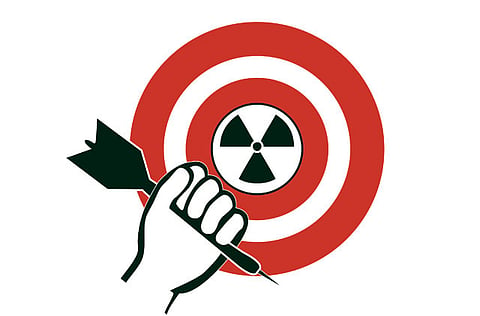Support for war with Iran is growing
The media and the far right are working together to encourage a unilateral Israeli strike

Will Israel launch a unilateral strike against Iran? This question is increasingly the subject of intense debate in Israel and the United States as well as in European and Arab capitals. How it is answered will have profound consequences for the Middle East, for the price of oil and the world economy, for the Israeli-American relationship and for America's ability to influence events and protect its vital interests and allies in the region.
Although the Obama administration has said that all options are on the table in dealing with Iran — meaning that a military solution has not been ruled out — it is clear that President Barack Obama prefers non-military solutions such as diplomacy and engagement, leading up to increasingly tough sanctions.
Last week the American and Israeli press reported that the Obama administration had assured Israeli leaders that the threat of a nuclear Iran was not imminent and that it would take a year perhaps longer before Iran could produce its first nuclear bomb. American officials were quoted as saying that they believed that this assessment of the threat had diminished the prospect of an Israeli strike against Iranian nuclear installations.
Obama's perceived reluctance to use force is shared by Chairman of the Joint Chiefs of Staff Admiral Mike Mullen, who publicly expressed the view that attacking Iran was the least preferred option. Mullen recently told a forum at Columbia University that while a military solution might set back Iran's nuclear programme for a while, it would have "unintended consequences" that could easily outweigh the benefits.
The Israeli newspaper Haaretz has cautioned that "Israel can't launch a strike against Iran on its own" and expressed doubt about Israel's ability to act against the wishes of the United States and embark on an open-ended war against a nation of 70 million people.
Though still in the minority, the forces arguing for war against Iran are gathering momentum. Like in the months preceding the war against Iraq, the war party has the media on its side and is driven by Israel and some regimes in the Middle East and by American apologists for Israel and ideological supporters from the right in the United States.
A recent issue of the Bulletin of the Atomic Scientists urged American leaders to make decisions to sanction or attack Iran on the basis of facts, not media distortion.
The Bulletin focused on a recent report on Iran prepared by The International Atomic Energy Agency (IAEA) and finds a surprising consensus among the corporate media to distort the significance of the report.
The New York Times claimed that "Nuclear inspectors declared for the first time [that] they had extensive evidence of ‘past or current undisclosed activities' to develop a nuclear warhead". CNN reported that it was "the first time that the [IAEA] has issued such a strong warning about Iranian nuclear activities".
The Washington Post claimed that "[the IAEA] publicly suggested for the first time ... [that Iran] is actively seeking to develop a weapons capability".
The Bulletin pointed out that "the media [have] seriously misrepresented the actual contents of the report. In fact, no new information has been revealed". In fact, the IAEA says that it has "no concrete proof" that Iran has ever had a nuclear weapons programme" and, moreover, the IAEA report "doesn't contain any evidence that the public hasn't already seen".
Politicians and voices from the right have seized upon these distortions and flawed conclusions to argue that war against Iran has in fact become the only option left to forestall an Iranian bomb.
Pro-Israeli journalist Jeffrey Goldberg goes to unusual lengths in an article in The Atlantic magazine to make the point that the Obama administration should worry that Netanyahu will launch a unilateral air strike against Iran in the coming months unless Obama adopts a much tougher line with Iran.
To strengthen the case for war, Goldberg cites with approval Israeli concerns about the existential danger of a nuclear Iran and quotes former Iranian president Ali Akbar Hashemi Rafsanjani, who reportedly said: "The use of an atomic bomb against Israel would destroy Israel completely while [a nuclear attack] against the Islamic countries would only cause damages".
Goldberg draws from these preposterous remarks an equally preposterous conclusion, namely that "rational deterrence theory, or the threat of mutual assured destruction, might not apply in the case of Iran". Why not? No explanation is given.
The Bush administration's permanent ambassador to the UN John Bolton, meanwhile, has publicly urged Israel to attack Iran before it was too late.
It may be a sign of the gathering storm when a former high ranking official of the American government is publicly urging one state to launch an unprovoked attack against another.
Adel Safty is distinguished professor adjunct at the Siberian Academy of Public Administration in Russia.


